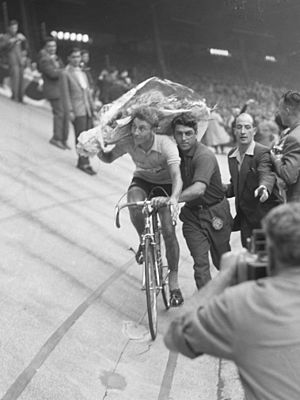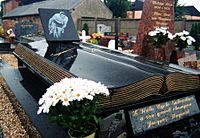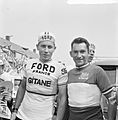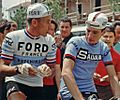Jacques Anquetil facts for kids
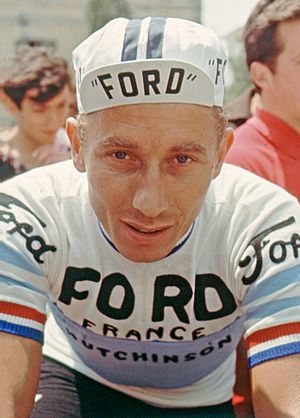
Anquetil at the 1966 Giro d'Italia
|
|||
| Personal information | |||
|---|---|---|---|
| Full name | Jacques Anquetil | ||
| Nickname | Monsieur Chrono Maître Jacques |
||
| Born | 8 January 1934 Mont-Saint-Aignan, France |
||
| Died | 18 November 1987 (aged 53) Rouen, France |
||
| Height | 1.76 m (5 ft 9+1⁄2 in) | ||
| Weight | 70 kg (154 lb; 11 st 0 lb) | ||
| Team information | |||
| Discipline | Road and track | ||
| Role | Rider | ||
| Rider type | All-rounder | ||
| Major wins | |||
|
|||
Jacques Anquetil ( 8 January 1934 – 18 November 1987) was a French road racing cyclist and the first cyclist to win the Tour de France five times, in 1957 and from 1961 to 1964.
He stated before the 1961 Tour that he would gain the yellow jersey on day one and wear it all through the tour, a tall order with two previous winners in the field—Charly Gaul and Federico Bahamontes—but he did it. His victories in stage races such as the Tour were built on an exceptional ability to ride alone against the clock in individual time trial stages, which lent him the name "Monsieur Chrono".
He won eight Grand Tours in his career, which was a record when he retired and has only since been surpassed by Eddy Merckx and Bernard Hinault.
Contents
Early life
Anquetil was born on 8 January 1934 in Normandy. He received his first bike from his father at the age of 4. When Jacques was seven, his father Ernest returned from his service in World War II and, unable to find building work except for the German occupying forces, moved with the family to Le Bourguet close to Quincampoix to become a strawberry farmer. It was here that the young Anquetil attended school, receiving good grades, particularly in mathematics. As his second bike grew to small for him, Anquetil needed a new one at the age of 11. With his father being unable to afford it, Jacques argued successfully to allow him to replace one of the workers on the strawberry fields, earning him the necessary money to buy a Stella bicycle on his own. At the age of 14, he began to attend Technical College in Rouen's southern district of Sotteville to become a metalworker. It was here that he met and befriended Maurice Dieulois, who rode amateur bike races on the weekends and whose father had been president of the local cycling club AC Sottevillais. Through him, Anquetil got into bicycle racing, signing up to the club under the tutelage of André Boucher late in the summer of 1950. Since it was too late to participate in any more races that year, he instead focussed on getting into shape for the coming season. Boucher recognized Anquetil's talent and offered him two bikes, one for training and one for races, as well as free supply of tyres, bike maintenance and a performance bonus. At the end of 1950, Anquetil gained his diploma and by the end of January 1951 had taken a job in a workshop in Sotteville, for a meager pay of 64 francs an hour. Since his employer would not allow him Thursday evening off, which the club used for training rides, he quit his position again at the beginning of March, moving back to working on his father's farm while pursuing a career in cycling.
Professional career
In 1953, Francis Pélissier, a former professional and sporting director of the La Perle team, offered Anquetil a contract in order to race in the Grand Prix des Nations in September. It was back then considered the most prestigious time trial event in the world, often described as the "unofficial world championship" for time trialists. Anquetil, still a minor, needed consent from his parents to sign the contract, which initially ran for two months from September to October 1953. He was paid 30,000 francs per month.
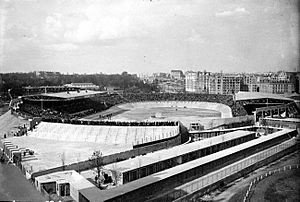
Anquetil won the time trial by a margin of almost seven minutes ahead of Roger Creton. Even though still just 19 years of age, he came within 35 seconds of beating the track record set by Hugo Koblet two years earlier. The victory made Anquetil an instant sensation in the sports press, with the Tour de France director Jacques Goddet writing an article in L'Equipe titled: "When the Child Champion was Born."
Anquetil followed up his victory three weeks later with another in the Grand Prix de Lugano in Switzerland. In 1957, at 23, Anquetil became the youngest Tour winner since the end of World War II.
He then went on to become the first cyclist to win the Tour de France five times. Anquetil was very good at riding time trials, and this helped him to win grand tours. He also won the Giro d'Italia in 1960 and 1964, and the Vuelta a España in 1963. This made him the first cyclist to win all three grand tours. In 1956 he rode 46.159 kilometres in one hour, setting a new hour record.
Post-retirement
After he retired from professional cycling, Anquetil spent most of his time tending to his own farm, even though it was not profitable. He also owned several properties in Cannes as well as a gravel pit in Normandy. Apart from these business endeavors, Anquetil served as race director at both Paris–Nice and the Grand Prix du Midi Libre. He wrote columns for the L'Equipe sports newspaper and worked as commentator during races, first on the radio for Europe 1 and then on television for Antenne 2. In the early 1970s, Anquetil agreed to help Richard Marillier, who had been his superior in the army in Algeria, run the French national cycling team. Anquetil did not really fulfill any practical function in his position, but helped bring Marillier, who was relatively unknown in the cycling world, a greater sense of authority. Anquetil continued in this position until the 1987 UCI Road World Championships, shortly before his death.
Riding style
Anquetil was a smooth rider, a beautiful pedalling machine according to the American journalist Owen Mulholland:
The sight of Jacques Anquetil on a bicycle gives credence to an idea we Americans find unpalatable, that of a natural aristocracy. From the first day he seriously straddled a top tube, "Anq" had a sense or perfection most riders spend a lifetime searching for. Between 1950, when he rode his first race, and nineteen years later, when he retired, Anquetil had countless frames underneath him, yet that indefinable poise was always there.
The look was that of a greyhound. His arms and legs were extended more than was customary in his era of pounded post World War II roads. And the toes pointed down. Just a few years before, riders had prided their ankling motion, but Jacques was the first of the big gear school. His smooth power dictated his entire approach to the sport. Hands resting serenely on his thin Mafac brake levers, the sensation from Quincampoix, Normandy, appeared to cruise while others wriggled in desperate attempts to keep up.
Personal life and family
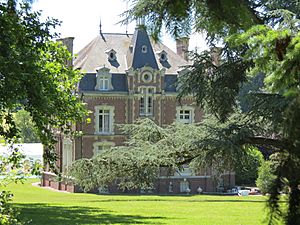
In March 1957, Anquetil began romantically involved with Jeanine Boëda, seven years his senior. They had known each other for several years before the start of their relationship. Jeanine's two children, her daughter Annie and her son Alain, moved in with them two years later. Jeanine would accompany Anquetil to most of his races, at a time when it was unusual for a partner to do so. The couple married on 22 December 1958. In late 1967, Anquetil bought the château next to the farm he owned close to Rouen. He prolonged his career by two years in order to be able to pay it off.
Following his retirement from professional cycling, Anquetil had a strong desire to father a child of his own. Their daughter, Sophie, was born in 1971. The couple remained happily married for another 12 years. Anquetil and Jeanine divorced in September 1987.
Illness and death
Anquetil was diagnosed with an advanced form of stomach cancer on 25 May 1987. According to both his childhood friend Dieulois and fellow Tour winner Bernard Hinault, Anquetil waited until he received proper treatment, delaying it to fulfill commentating duties over the summer before going to hospital. On 11 August, he had his stomach removed surgically. He died on 18 November 1987, surrounded by Sophie and Dominique, at the Saint Hilaire Clinic in Rouen.
Legacy
The 1997 Tour de France paid homage to Anquetil, on the 40th anniversary of his first Tour victory and ten years after his death, by having the Grand Départ around Rouen. On the day of the first stage, a ceremony was held at his grave and a pier in Quincampoix was renamed Quai Anquetil.
Career achievements
Major results
- 1952
- 3rd
 Team road race, Olympic Games
Team road race, Olympic Games - 8th Amateur road race, UCI Road World Championships
- 1953
- 1st Grand Prix des Nations
- 1st Grand Prix de Lugano
- 2nd Trofeo Baracchi (with Antonin Rolland)
- 1954
- 1st Grand Prix des Nations
- 1st Grand Prix de Lugano
- 2nd Critérium des As
- 2nd Trofeo Baracchi (with Louison Bobet)
- 5th Road race, UCI Road World Championships
- 7th Overall Paris–Nice
- 1st Stage 5
- 9th Critérium National de la Route
- 10th Overall Tour de l'Ouest
- 1955
- 1st Grand Prix des Nations
- 2nd Trofeo Baracchi (with André Darrigade)
- 6th Road race, UCI Road World Championships
- 9th Overall Tour du Sud-Est
- 1st Stage 6
- 1956
- 1st Grand Prix des Nations
- 2nd
 Individual pursuit, UCI Track World Championships
Individual pursuit, UCI Track World Championships - 8th Critérium National de la Route
- 9th Overall Grand Prix du Midi Libre
- 1957
- 1st
 Overall Tour de France
Overall Tour de France
- 1st Stage 3a (TTT), 3b, 9, 15b (ITT) & 20 (ITT)
- 1st
 Overall Paris–Nice
Overall Paris–Nice
- 1st Stage 5a (ITT)
- 1st Grand Prix des Nations
- 1st Six Days of Paris (with André Darrigade and Ferdinando Terruzzi)
- 4th Trofeo Baracchi (with André Darrigade)
- 6th Road race, UCI Road World Championships
- 7th Critérium National de la Route
- 1958
- 1st
 Overall Four Days of Dunkirk
Overall Four Days of Dunkirk
- 1st Stage 4 (ITT)
- 1st Grand Prix des Nations
- 1st Grand Prix de Lugano
- 2nd Trofeo Baracchi (with André Darrigade)
- 10th Overall Paris–Nice
- 1st Stage 5a
- 10th Milan–San Remo
- 1959
- 1st
 Overall Four Days of Dunkirk
Overall Four Days of Dunkirk
- 1st Stage 4 (ITT)
- 1st Critérium des As
- 2nd Overall Giro d'Italia
- 1st Stages 2 (ITT) & 19 (ITT)
- 1st Grand Prix de Lugano
- 3rd Overall Tour de France
- 3rd Gent–Wevelgem
- 3rd Trofeo Baracchi (with André Darrigade)
- 5th Critérium National de la Route
- 9th Road race, UCI Road World Championships
- 1960
- 1st
 Overall Giro d'Italia
Overall Giro d'Italia
- 1st Stage 9b (ITT) & 14 (ITT)
- 1st Critérium des As
- 1st Grand Prix de Lugano
- 3rd Critérium National de la Route
- 8th Paris–Roubaix
- 8th Overall Tour de Romandie
- 1st Stage 4b (ITT)
- 9th Road race, UCI Road World Championships
- 1961
- 1st
 Overall Tour de France
Overall Tour de France
- 1st Stages 1b (ITT) & 19 (ITT)
- 1st
 Overall Paris–Nice
Overall Paris–Nice
- 1st Stage 6a (ITT)
- 1st Overall Super Prestige Pernod International
- 1st Critérium National de la Route
- 1st Grand Prix des Nations
- 1st Grand Prix de Lugano
- 2nd Overall Giro d'Italia
- 1st Stage 9 (ITT)
- 3rd Mont Faron hill climb
- 4th Critérium des As
- 6th La Flèche Wallonne
- 10th Overall Tour de Romandie
- 1st Stage 2b (ITT)
- 1962
- 1st
 Overall Tour de France
Overall Tour de France
- 1st Stages 8b (ITT) & 20 (ITT)
- 1st Trofeo Baracchi (with Rudi Altig)
- 9th Critérium des As
- 1963
- 1st
 Overall Tour de France
Overall Tour de France
- 1st Stage 6b (ITT), 10, 17 & 19 (ITT)
- 1st
 Overall Vuelta a España
Overall Vuelta a España
- 1st Stage 1b (ITT)
- 1st
 Overall Paris–Nice
Overall Paris–Nice
- 1st Stage 6a (ITT)
- 1st
 Overall Critérium du Dauphiné Libéré
Overall Critérium du Dauphiné Libéré
- 1st Stage 6a (ITT)
- 1st
 Overall Critérium National de la Route
Overall Critérium National de la Route
- 1st Stage 3 (ITT)
- 1st Overall Super Prestige Pernod International
- 1st Critérium des As
- 2nd Trofeo Baracchi (with Raymond Poulidor)
- 1964
- 1st
 Overall Tour de France
Overall Tour de France
- 1st Stage 9, 10b (ITT), 17 (ITT) & 22b (ITT)
- 1st
 Overall Giro d'Italia
Overall Giro d'Italia
- 1st Stage 5 (ITT)
- 1st Gent–Wevelgem
- 1st Stage 1 Critérium National de la Route
- 3rd Overall Super Prestige Pernod International
- 3rd Critérium des As
- 6th Overall Paris–Nice
- 1st Stage 3 (ITT)
- 7th Road race, UCI Road World Championships
- 1965
- 1st
 Overall Paris–Nice
Overall Paris–Nice - 1st Bordeaux–Paris
- 1st
 Overall Critérium du Dauphiné Libéré
Overall Critérium du Dauphiné Libéré
- 1st Stages 3, 5 & 7b (ITT)
- 1st
 Overall Critérium National de la Route
Overall Critérium National de la Route
- 1st Stage 3 (ITT)
- 1st Overall Super Prestige Pernod International
- 1st Trofeo Baracchi (with Jean Stablinski)
- 1st Grand Prix des Nations
- 1st Grand Prix de Lugano
- 1st Critérium des As
- 1st Mont Faron hill climb
- 4th Overall Giro di Sardegna
- 7th Trofeo Laigueglia
- 8th Giro di Lombardia
- 1966
- 1st
 Overall Paris–Nice
Overall Paris–Nice
- 1st Stage 8
- 1st
 Overall Giro di Sardegna
Overall Giro di Sardegna - 1st Overall Super Prestige Pernod International
- 1st Liège–Bastogne–Liège
- 1st Grand Prix des Nations
- 2nd
 Road race, UCI Road World Championships
Road race, UCI Road World Championships - 2nd Overall Volta a Catalunya
- 1st Stage 6b
- 3rd Overall Giro d'Italia
- 3rd Grand Prix de Lugano
- 4th Giro di Lombardia
- 1967
- 1st
 Overall Volta a Catalunya
Overall Volta a Catalunya
- 1st Stage 7b (ITT)
- 1st
 Overall Critérium National de la Route
Overall Critérium National de la Route - 2nd Trofeo Baracchi (with Bernard Guyot)
- 2nd Critérium des As
- 3rd Overall Giro d'Italia
- 7th Overall Giro di Sardegna
- 1968
- 1st Trofeo Baracchi (with Felice Gimondi)
- 4th Liège–Bastogne–Liège
- 5th Critérium des As
- 10th Overall Paris–Nice
- 1969
- 1st
 Overall Tour of the Basque Country
Overall Tour of the Basque Country - 3rd Overall Paris–Nice
- 4th Overall Critérium du Dauphiné Libéré
General classification results timeline
| Grand Tour general classification results timeline | ||||||||||||||||||
| Grand Tour | 1954 | 1955 | 1956 | 1957 | 1958 | 1959 | 1960 | 1961 | 1962 | 1963 | 1964 | 1965 | 1966 | 1967 | 1968 | 1969 | ||
|---|---|---|---|---|---|---|---|---|---|---|---|---|---|---|---|---|---|---|
| – | – | – | – | – | – | – | – | DNF | 1 | – | – | – | – | – | – | |||
| – | – | – | – | – | 2 | 1 | 2 | – | – | 1 | – | 3 | 3 | – | – | |||
| – | – | – | 1 | DNF | 3 | – | 1 | 1 | 1 | 1 | – | DNF | – | – | – | |||
| Major stage race general classification results | ||||||||||||||||||
| Race | 1954 | 1955 | 1956 | 1957 | 1958 | 1959 | 1960 | 1961 | 1962 | 1963 | 1964 | 1965 | 1966 | 1967 | 1968 | 1969 | ||
| — | — | — | — | — | — | — | — | — | 11 | — | 4 | 1 | 7 | — | DNF | |||
| 7 | — | — | 1 | 10 | 11 | DNF | 1 | DNF | 1 | 6 | 1 | 1 | 16 | 10 | 3 | |||
| 9 | — | — | 7 | — | 5 | 3 | 1 | — | 1 | DNF | 1 | — | 1 | — | 11 | |||
| — | — | — | — | — | — | — | — | — | — | — | — | — | — | — | 1 | |||
| — | — | — | — | 1 | 1 | — | — | — | — | — | — | 12 | — | — | — | |||
| — | — | — | — | — | — | 8 | 10 | — | — | — | — | — | — | — | — | |||
| — | 15 | — | — | — | — | — | — | 12 | 1 | — | 1 | — | — | — | 4 | |||
| — | — | 9 | — | — | — | — | — | — | — | — | 14 | — | — | — | — | |||
| — | — | — | — | — | — | — | — | — | — | — | — | 2 | 1 | — | — | |||
Monuments results timeline
| Monument | 1954 | 1955 | 1956 | 1957 | 1958 | 1959 | 1960 | 1961 | 1962 | 1963 | 1964 | 1965 | 1966 | 1967 | 1968 |
|---|---|---|---|---|---|---|---|---|---|---|---|---|---|---|---|
| Milan–San Remo | — | — | 12 | 17 | 10 | — | 23 | — | — | — | — | — | — | — | — |
| Tour of Flanders | — | — | — | — | — | — | 14 | — | — | — | — | — | — | — | — |
| Paris–Roubaix | 53 | 15 | 31 | 25 | 14 | 24 | 8 | 60 | 31 | — | — | 16 | — | — | — |
| Liège–Bastogne–Liège | — | — | — | — | — | — | — | — | — | — | — | — | 1 | — | 4 |
| Giro di Lombardia | — | — | — | 23 | 12 | 21 | 34 | 17 | — | — | — | 8 | 4 | — | — |
| — | Did not compete |
|---|---|
| DNF | Did not finish |
World records
| Discipline | Record | Date | Velodrome | Track | Ref |
|---|---|---|---|---|---|
| Hour record | 46.159 km | 29 June 1956 | Vigorelli (Milan) | Indoor | |
| 27 September 1967 |
Awards and decorations
- BBC Overseas Sports Personality of the Year: 1963
- National Order of the Legion of Honour (France): 1966
Images for kids
-
The Velodromo Vigorelli in Milan, where Anquetil set his hour record.
-
Charly Gaul (right) beat Anquetil (left) into second place at the 1959 Giro d'Italia.
-
Anquetil (centre) climbing during the 1960 Giro d'Italia alongside Jos Hoevenaers, Gastone Nencini, and Charly Gaul (from left to right)
-
Anquetil with his Saint-Raphaël teammates Ab Geldermans (left) and Mies Stolker (right) at the 1962 Tour de France
-
Anquetil and Felice Gimondi (right) at the 1966 Giro d'Italia
-
Anquetil in the pink jersey ahead of stage 21 of the 1967 Giro d'Italia, the last time he wore a leader's jersey at a Grand Tour.
-
Raymond Poulidor, Anquetil, and Federico Bahamontes (from left to right) on the podium of the 1964 Tour de France
See also
 In Spanish: Jacques Anquetil para niños
In Spanish: Jacques Anquetil para niños


